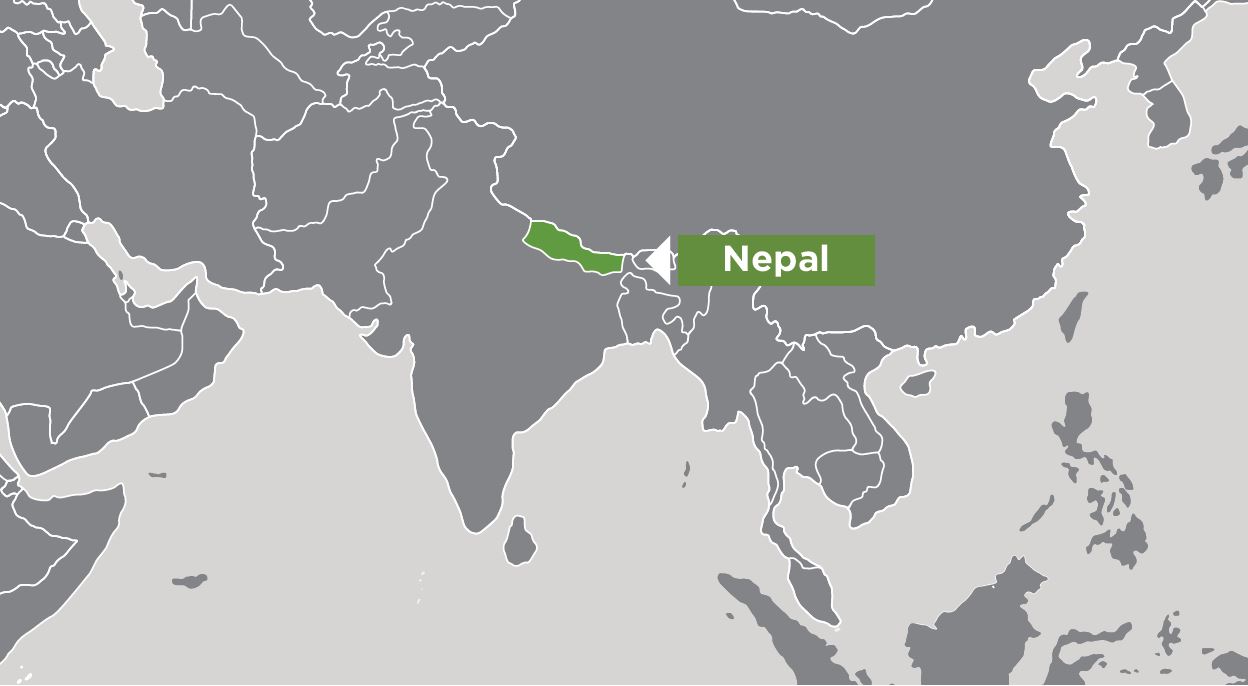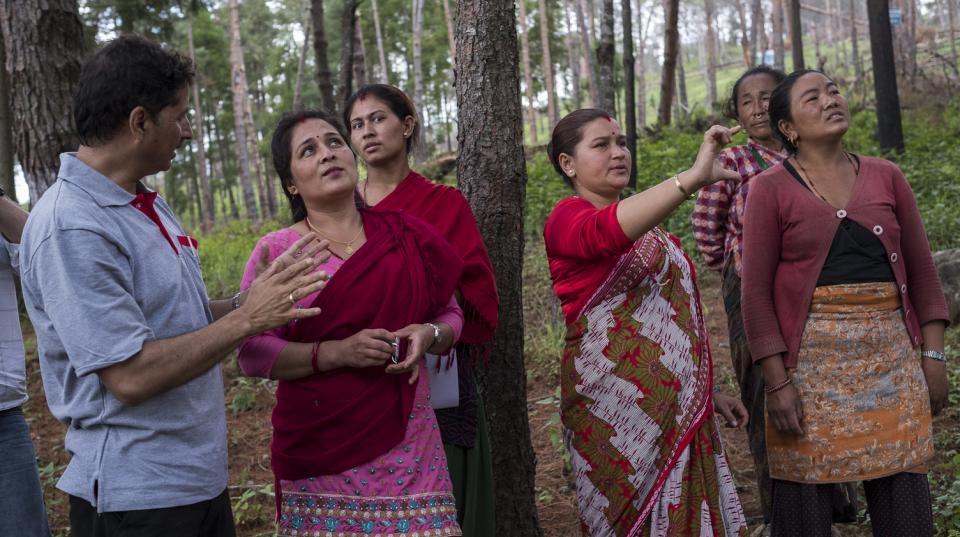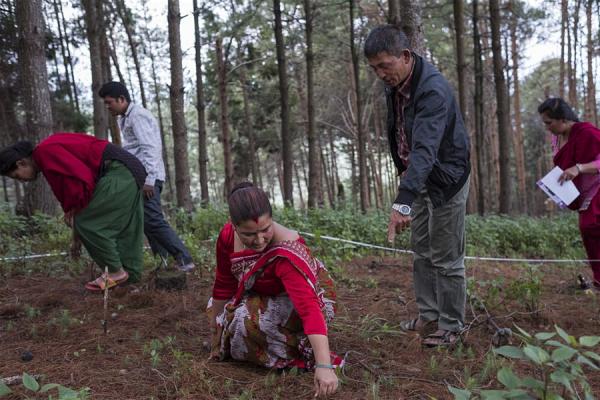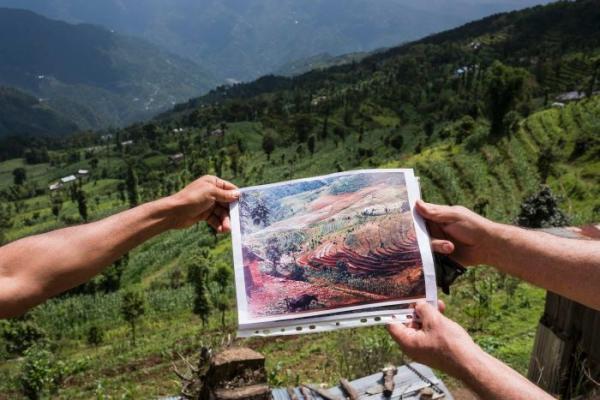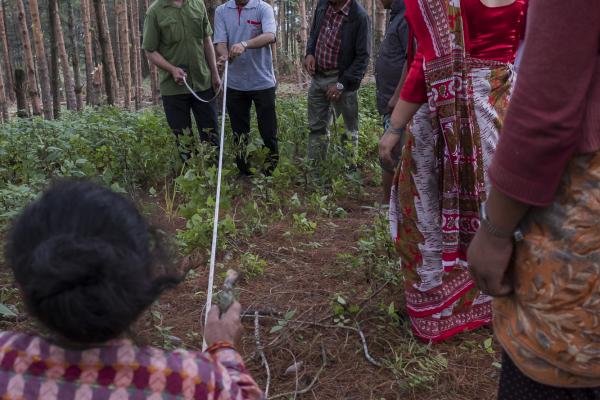Overview
This project aims to enhance forest management practices in community forests and private land to improve livelihoods, social equity and environmental impacts.
Nepal’s Middle Hills are home to 44 per cent of the country’s population, with more than two-thirds relying on a combination of agriculture and forest products for their livelihoods.
A quarter of forest lands have been handed over to 19,000 Community Forest User Groups under a Nepali national program. But the management of community forests and associated agricultural systems in the Middle Hills is sub-optimal and the Government of Nepal would like to see greater wealth being generated.
Livelihood opportunities remain limited and food insecurity is widespread as a result. Underlying these problems are inequitable planning and governance; gender inequities in decision-making; and an emphasis on the protection of forest products.
Expected outcomes
- Greater application of Active and Equitable Forest Management in Nepal’s community forests, leading to significantly increased incomes for local communities from sale of forest products.
- Enhanced silviculture skills of government foresters/technicians being used to provide institutional support for silviculture practice.
- Men, women and poor households having enhanced skills in managing local forest enterprises.
- Framework for pro-poor and gender equitable governance being used to enhance effectiveness of Nepal’s community forests.
Summary of outcomes to date
2022–23
EnLiFT2 Project achievements for the period July 2022 to June 2023 are summarised below:
Bagmati Province SFM Guidelines: EnLiFT2 played a key role in bringing the Bagmati Province Ministry of Forest and Environment, FECOFUN and FenFIT towards breaking the deadlock in forest management through a new provincial level SFM guideline. We facilitated forming a task force, provided technical inputs based on lessons from EnLiFT2 research and organised a provincial level workshop involving all senior people from the Ministry, Forest Directorate, DFOs, FECOFUN, FenFIT and EnLiFT2 researchers. The draft developed by the taskforce was presented, and participants discussed and finalised the guidelines. The Ministry approved and officially circulated it to the DFOs. Though it was slightly late last year, we expect that forest management will be expedited across the province including our research districts Kavre and Sindhupalchowk. The Ministry, DFOs, FECOFUN, FenFIT and stakeholders at national level appreciate the role EnLiFT2 played in coordination, technical inputs and financial support toward issuing this Guideline. It has been taken as a good case of research- to- policy pathway for EnLiFT2. Our team is also proud of this outcome. We need to focus on rolling this out in the coming forest management season (see EnLiFT2 website, “Guidelines and Constitutions of private forest owners in Bhumlu and Chautara” tab for Bagmati Province SFM Guideline, Nepali document).
Portable sawmill: The introduction of portable sawmills in forested hill landscapes has made significant progress. We forged a negotiation between the DFO and Cluster Level Forest Management Committee, formalised the transfer of the sawmill to the Committee, extensively piloted it in Chautara and organised an EPPL on it. We now have a robust technical and economic analysis of sawmill’s performance. Our findings show the sawmill performance is at par with the stationary broad band sawmill operating in urban areas. This is more efficient in providing sawing services to communities in rural areas who had been facing exhaustive permit issues, high cost of sawing and transportation and inconvenience to meet their timber sawing needs. Accordingly, we observed a wider acceptance from local stakeholders and readiness of senior forest officials to institutionalise it in the field. There is now a plan to develop a work procedure in collaboration with DFO and its submission to the Provincial Ministry of Forest and Environment; we will focus on these areas next. It Is a good prospect that the Ministry will approve this Work Procedure which will open up the wide adoption of the portable sawmill from next year onwards. Action points have been identified and further policy engagement is continuing.
Women leadership: Increased women leadership in their respective CFUGs, FECOFUN, local governments and other social institutions have been observed and can be attributed to EnLiFT2 interventions. A series of training, workshops, exposure visits and backstopping in their respective fields of actions have been organised and outcomes are monitored. Women leaders have begun to show assertiveness, questioned the prevailing exclusionary and male-dominated leadership, strongly represented in recently elected Palika level and higher levels of FECOFUN committees, are demanding more capacity-building events and have shown increased confidence in prospects of women leadership in CF. This is the result of four training sessions on "Women Leadership Development in Forest Management" involving 69 women and five men. Similarly, five one-day orientation events on women and forest management involved 135 women and 12 men. To keep up with the momentum, we plan to continue to focus on these women to provide further leadership support within the project-run activities.
Institutionalisation of Cluster Committees: The cluster level mechanism has become more active, has begun to be involved in mobilising member CFUG and is better connected with key stakeholders namely DFO, and local governments. The formal meeting and informal communication between the cluster members has increased. The Cluster Committee has organised events aimed at enhancing the institutional governance of member CFUGs. They have begun to facilitate various forest management-related issues between CFUG and DFO. For example, in Rachma CFUG, they negotiated with the DFO and CFUG leadership and facilitated the process of harvesting the fallen trees. Similarly, they facilitated Lankuri CFUG (Bhumlu) AGM and EC meetings and timber harvesting. Currently, they are working together with the CFUG to collaborate in development activities. In Chautara, out of 18 CFUGs, in the last fiscal year, 15 CFUGs were passive and had not carried out any mandatory institutional activities. However, now, following the cluster mechanism, 12 CFUGs have completed their mandatory institutional process and have submitted the relevant documents to DFO and the Municipality. All these initiatives have developed a prospect of expediting forest management in the coming season.
Nursery standardisation and certification: EnLiFT2 has made important progress towards standardisation, accreditation and certification of forest nurseries. After a series of technical work on the document, training and consultation with nursery managers, and workshops jointly organised with FRTC and Bagmati provincial MOFE, there has been good progress towards it. The Guidelines are under technical review. We have already received good inputs from DFOs and Watershed Officers of Bagmati MOFE. A nursery training manual has already been prepared with inputs from FRTC and has been published as EnLiFT2 RPS. The proposed works have significantly paved the way for nursery standardization and certification. The project team plans to continue the initiative to obtain Standardisation Guidelines approval by the relevant authorities of the government (view the report on Nursery standardization on the EnLiFT2 website under Publications > Other Materials > Miscellaneous).
Private forest owners association: An EnLiFT2 initiative to equip and organise private forest owners has produced good achievements. Farmers groups are formed, and they have gained good knowledge of silvicultural aspects, timber market and legal issues. Several on-the-site field training, theoretical classes, and workshop-style sessions have helped them gain needed technical knowledge of managing forests. Also, they are benefitting from similar events on regulatory and market-related information. Two farmers associations are in the process of registration in the respective municipalities. With this added knowledge, skill and political voice, they are in a better position to benefit from forestry activities. The project will work further towards institutionalising these gains that will help sustain and expand beyond EnLiFT2.
Silvicultural demonstration: Silvicultural demonstration: In this reporting period, two silvicultural demonstration plots were established in Betanchowk municipality (Kavre district) to demonstrate (1) Quercus fodder management in Kalapani CFUG and (2) Timber-fodder stand improvement in Ghelkhola CFUG. The demonstration from Kalapani CFUG was proven to be useful in building forest users awareness on different ways of managing Quercus forest for fodder production. As a result of this demonstration, the nearby Ghelkhola CFUG adopted their learnings to implement a timber fodder stand improvement demonstration. Additionally, a whole-CF management planning was also demonstrated in Asetar Batase CFUG in Chautara municipality (Sindhupalchowk district). The demonstraton of whole-CF planning process was appreciated by CFUG members and District Forest Officers to be innovative and essential in increasing forest users capacity to managed community forest for various products and services needed for day-to-day livelihood activities of forest users who are residing in the village as opposed to only timber management.
2021–22
- Cluster level CF governance and planning mechanism: EnLiFT2 facilitated, and supported, the formation of an entity comprising local government, DFO, FECOFUN, CFUG, leasehold forestry groups, and private forest owners, to institutionalise a cluster level governance and planning mechanism in Kavre and Sindhupalchowk. The main objective of this mechanism is to: i) reduce transaction costs of supplying forest products; ii) design and enforce service provisioning at the local level; iii) increase the bargaining power of local user group members; iv) establish a community-public-private partnership model; and v) establish a knowledge-sharing and exchange forum.
- Report launched: ‘Revitalising community forestry in the changing socio-economic context of Nepal’ report launched by the Secretary of Ministry of Forests and Environment and H.E Ambassador of Australia, Ms Felicity Volk, in Kathmandu. The report presents nine separate chapters encompassing different dimensions of community forestry including silviculture, enterprise, governance and institutions, policy, and climate change among others in addition to laying out future directions to revitalising CF in the changing socio-economic condition of the country.
- National CF workshop: EnLiFT2 team members were involved in the overall organization of the 7th National Community Forestry Workshop (12-14 June 2022). In addition to supporting the organizing of the workshop, EnLiFT2 researchers presented research papers, moderated a panel discussion, participated as a presenter in a panel discussion, organized a side event (where posters of EnLiFT2 activities were presented), and supported in the reporting of the three-day event.
- Testing of portable saw mill: A three-day testing and demonstration of a portable saw mill was held in April 2022 to test the technical, economic and social performance of the mill. The technology largely proved to be a very useful intervention for on-site milling in Nepalese hills where transporting logs to nearby towns for sawing has been costly. The next step is assessing regulatory and institutional strategy for its wider scale out.
- Power chainsaw training: A two-day refresher training on chain saw operation was conducted on 16 February 2022. Local youths who have been using chain saws and relevant forest technicians from both districts (nine in total) benefited from it. Introduction of these chain saws has substantially reduced the cost of tree felling including the loss of wood. The training has helped strengthen the efficiency, safety and confidence of forest technicians.
- Khasru trial plots: Four khasru (Quercus semecarpifolia) research plots were established in Kalopani community forest, Bethanchowk rural municipality. Khasru is the major fodder tree species which substantially contributes to the emerging dairy enterprises of CF members in the area. The trial is aimed at enhancing the productivity of khasru.
- Nursery training: A five-day nursery training on quality seedling production was held, in which 20 nursery managers and forest technicians representing the government, community and private nursery benefited.
- Nursery certification: A national nursery standardisation and certification process has been initiated in partnership with FRTC. A draft manual with standards and criteria and proposed institutional mechanism has been prepared and is under review. After review, it will be refined, shared among stakeholders and submitted to the FRTC for its formalisation process. This initiative will be a game-changer in nursery management and will facilitate promotion of private nurseries in the country.
- Gender training: Four two-day training sessions on introductory issues of gender in forestry were conducted with women leaders of 30+ CFUGs in Bhumlu and Chautara. These trainings remained very instrumental in bringing women leaders to the forefronts of not only CFUG activities but also cluster-level institutional processes.
- Forest fire training: Two 2-day training on forest fire was organised one in each cluster for the CFUG leaders and members of 30+ CFUGs. Both of our clusters are experiencing heavy forest fires every spring that destroys felled and piled logs, new regeneration, and even the standing trees. These training are expected to develop basic awareness, some core skills and also develop workable mechanisms at CFUG level and cluster level to prevent, manage and mitigate the effects of forest fire.
- Second phase interviews: with forest-based entrepreneurs based in Kavre and Sindhupalchowk were conducted. Four categories of interviewees were involved - farmers and CFUG members; local traders (at district level); sawmill operators; and DFO staff. The primary purpose of the interviews was to have a better understanding of opportunities and challenges in the value chain of timber trade. In addition, a regulatory framework that facilitates, and/or hinders the supply chain of timber was also assessed.
- Tole-level planning: Seven Tole-level planning meetings were held in two CFUGs in two clusters. Each CFUG has several toles which are the primary units of CF planning and implementation. Apart from bottom-up planning, these meetings help improve CFUG governance and performance. The Tole-level planning meetings are also an important source of qualitative data on governance, institutions and enterprises.
- Advancing research -policy interface methodology in the new federal governance context: EPPL methodology is being further advanced involving local and provincial government agencies, vis-à-vis local communities and small scale forest entrepreneurs to stimulate new policy options based on EnLIFT’s participatory research. More recent adaptations of the methodology include: i) organising structured sites visits of the policy makers and creating situations for researcher facilitated informal conversations between policy makers local communities and small forest enterprises; ii) adapting EPL type of policy dialogue models in the government led community forestry conference at the national level; iii) engaging University faculty and a post graduate student in EPPL process.
